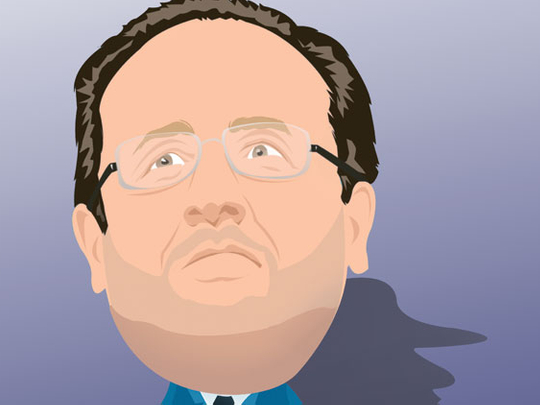
There are two sets of European elections this weekend. Everyone wants to know what the Greeks will decide. To my mind the more consequential question may turn out to be: what does France think? Greece poses the immediate threat, but monetary union is a Franco-German construction. To assure its future German Chancellor Angela Merkel and French President Francois Hollande must recast the bargain struck at Maastricht by former German chancellor Helmut Kohl and former French president Mitterrand.
Barring a political earthquake, the second round of the French assembly elections will ratify Hollande’s victory in the presidential poll. A governing majority in the assembly would allow the Socialists to take full command of national politics for the first time since 1993.
With power comes responsibility. The election campaign has given Hollande an excuse to equivocate. Now he confronts a set of decisions as profound as any faced by a president of the Fifth Republic. France, above all among Europe’s big powers, cannot afford to see the euro fail. Yet saving it presents at once a powerful challenge to its self-image as Germany’s equal and to its Gaullist allegiance to a European Union of sovereign states.
Curiously, for all the opprobrium heaped on Merkel for her reluctance thus far to act decisively, Germany has been thinking more carefully than its partners about the end state for monetary union. Understandably enough, anxieties in Madrid and Rome have focused on immediate funding problems. The Germans take a long-term view.
In this Merkel is at one with Mario Draghi, the (Italian) president of the European Central Bank. Draghi’s exasperated refrain has been that the euro will be secure only when politicians set out a destination. I am not sure Merkel has a blueprint for the Brussels summit of European leaders at the end of this month.
Sure, the Germans say in private conversations, Eurozone debt can eventually be pooled — as long as there is also shared decision-making. Supervision of, and responsibility for, systemically important banks can indeed be entrusted to a Eurozone-wide authority. But monetary and financial union must be buttressed by joint institutions charged with the economic governance of the Eurozone.
Germany’s answer, in other words, is more Europe. Kohl wanted a political union at the outset of the enterprise. Mitterrand rebuffed him. France’s enthusiasm for building Europe has not diminished its parallel resolve that the big decisions are reserved for national governments. There have been moments of compromise — as when Jacques Delors ran the European Commission — but De Gaulle’s l’Europe des patries has remained the leitmotif of French policy. Now Merkel is asking for the treaty changes denied to Kohl. Thus far Hollande has shown only part of his negotiating hand. The new president wants the Eurozone to swap the mantra of austerity for policies to promote growth. France backs calls for more funding for the European Investment Bank and faster disbursement of structural funds. Officials said Hollande also wanted a financial stability package that would see the European Stability Mechanism providing direct support to banks and ECB assume oversight of the Eurozone financial sector.
Such proposals echo demands from Italy’s Mario Monti and Spain’s Mariano Rajoy for forceful short-term measures to shore up the credibility of the euro. The implication so far is that Hollande is ready to play hardball in negotiations with Merkel. Nicolas Sarkozy, his predecessor, cast himself as her equal. The facts of European power have turned against France. Mitterrand had a big bargaining chip in the shape of support for German unification. Hollande also has problems at home, He has promised economic growth, but is committed to reining back France’s fiscal deficit. The country’s competitiveness problems are not as acute of those of Spain or Italy, but they are serious enough.
To decouple from Germany and put France at the head of Europe’s Club Med would be to tear up half a century of French European policy. My friends in Paris tell me that such a shift would represent a national humiliation. The alternative, however, is to step out of De Gaulle’s shadow and sign up for the leap to integration demanded by Merkel. This looks uncomfortably like an excruciating choice in which heads-Germany-wins and tails-France-loses.
—Financial Times











